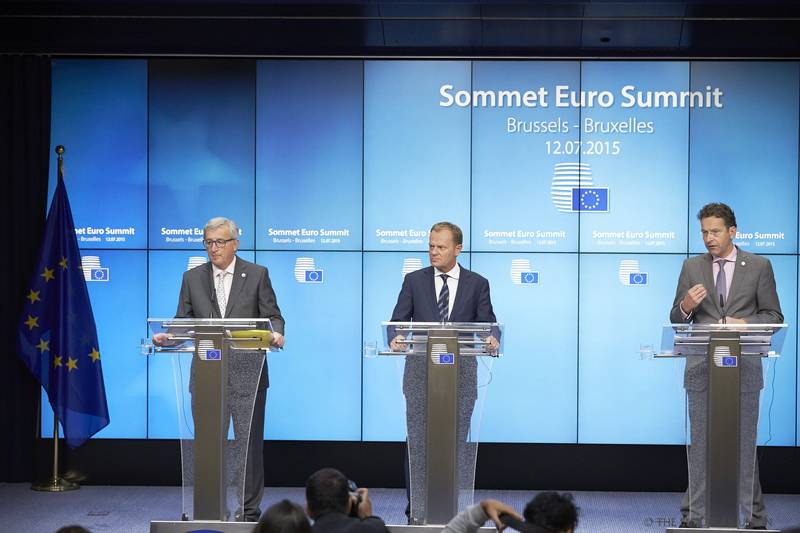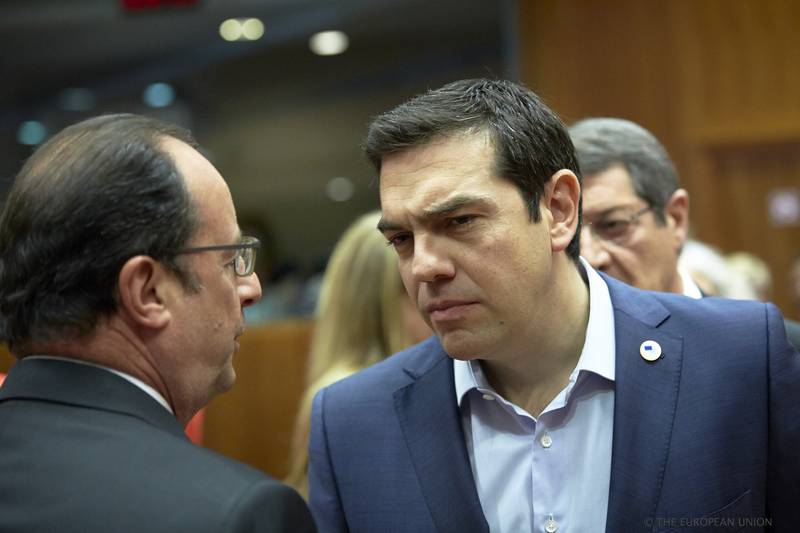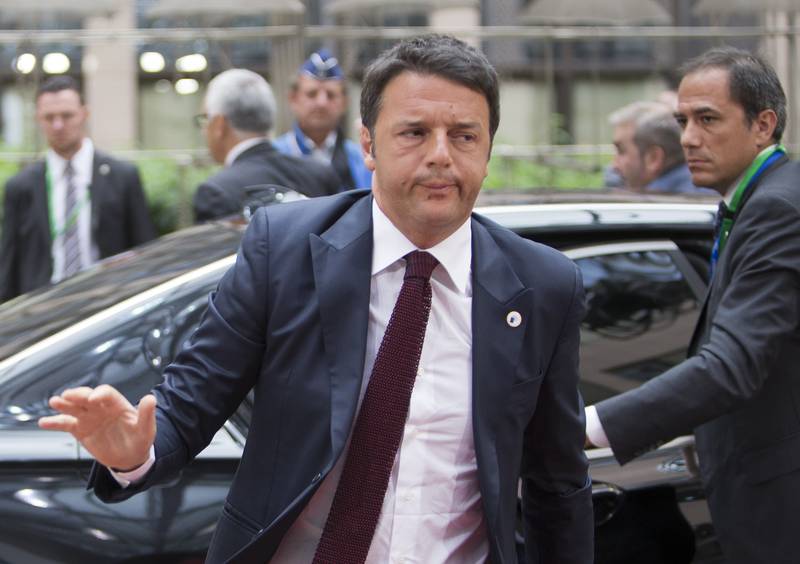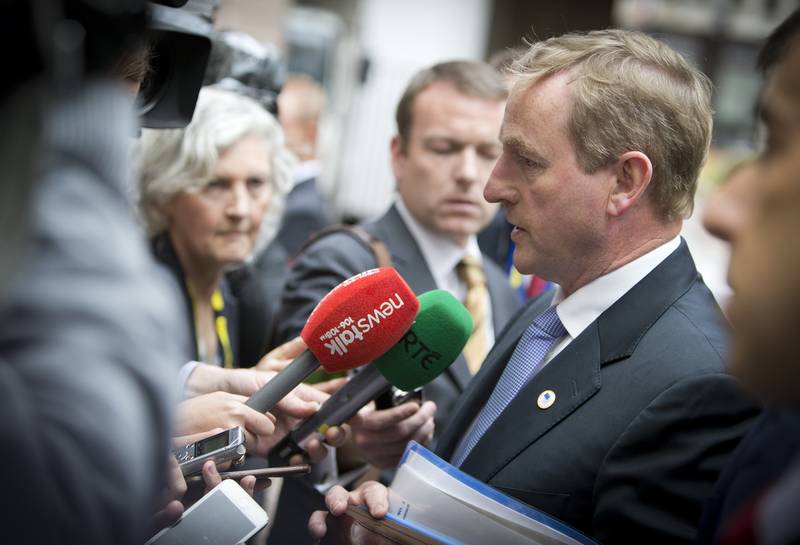Greece Got a Promise for a Deal
Adelina Marini, July 14, 2015
 Hundreds of hours of negotiations, multiple meetings over the last six months, many punches below the belt exchanged, insults, playing around with history, mocking democracy, and a huge waste of paper and energy were invested in Greece staying in the Eurozone, practically in a pre-accession regime. After the latest 17-hour marathon summit of Eurozone leaders Greece got a promise of a deal, provided it meets in a very short term several preconditions, without which there will be no third bailout programme with the corresponding funding. Although to French President François Hollande Monday was a historic day for Europe there was no cheering, no applauses, and no bottles of champagne. There was only huge exhaustion and even more shootouts between leftists and rightists on Twitter. As young Italian Prime Minister Matteo Renzi summed up the situation, “I'm happy we saved Greece but the real challenge is to save Europe.”
Hundreds of hours of negotiations, multiple meetings over the last six months, many punches below the belt exchanged, insults, playing around with history, mocking democracy, and a huge waste of paper and energy were invested in Greece staying in the Eurozone, practically in a pre-accession regime. After the latest 17-hour marathon summit of Eurozone leaders Greece got a promise of a deal, provided it meets in a very short term several preconditions, without which there will be no third bailout programme with the corresponding funding. Although to French President François Hollande Monday was a historic day for Europe there was no cheering, no applauses, and no bottles of champagne. There was only huge exhaustion and even more shootouts between leftists and rightists on Twitter. As young Italian Prime Minister Matteo Renzi summed up the situation, “I'm happy we saved Greece but the real challenge is to save Europe.”
According to Jean-Claude Juncker, who is a veteran in European politics and in the Greek crisis negotiations over the last five years, there are no winners and losers in Monday morning's agreement. This is a typical European compromise, he said on exiting the Council building in Brussels. Actually there are losers and democracy is one. It is a constant loser in Greece over the last six months. First SYRIZA came into power after promising the demos unrealistic and unfounded promises. The second blow below the belt to democracy came with the ridiculous referendum, announced just a week before it was conducted. A week’s campaign, based on an invalid document, not translated into Greek for half of the duration of the campaign.
Not even mentioning the created inability to vote for a number of Greek citizens. The third heavy blow came when, just a week after the so called “celebration of democracy”, Tsipras accepted conditions many times stricter than what was offered in the beginning of his term, completely disregarding the “people’s will”, showing the referendum to him was just another of his instruments for pressure on the Eurozone, not an exercise in democracy, let alone “celebration of democracy”. Celebrating democracy is yet to come when the procedures of approving the new agreement start in national parliaments of the 19 members of the currency club. In this regard, special attention is due to the line of Dutch finance minister and Eurogroup leader Jeroen Dijsselbloem that the Greek parliament now will have to vote legislative measures in urgent fashion by Wednesday, while national parliaments of the other Eurozone members, being sovereign, will vote on a possible new deal with Greece according to their schedules. As Mr Juncker admitted, requirements to Greece are way heavier than they were before the referendum.
The trust, Sancho!
The reason is a complete loss of trust. This is precisely what the statement following the summit starts with, repeating the word several times: “Given the need to rebuild trust with Greece, the Euro Summit welcomes the commitments of the Greek authorities to legislate without delay a first set of measures.” Greek parliament is to vote by July 15 legislation on streamlining of the VAT system and the broadening of the tax base; the safeguarding of the full legal independence of the Greek Statistics authority; full implementation of the relevant provisions of the Fiscal Compact – the intergovernmental t reaty for fiscal discipline, providing for automated debt brakes and the creation of independent political fiscal councils to monitor governments’ fiscal policies.
reaty for fiscal discipline, providing for automated debt brakes and the creation of independent political fiscal councils to monitor governments’ fiscal policies.
By July 22 Greece needs to vote in a new Civil Procedure Code, aiming to speed-up judicial procedures considerably and lower expenses. Greece is also expected to apply without delay the new Directive on bank recovery and resolution (BRRD). All these measures must be agreed and approved by the institutions. In a previous draft of the agreement all these measures were supposed to be voted in by Greek MPs by July 15. It is after they are voted in, as well as endorsement of all other commitments in the agreement could a decision for starting negotiations on a third bailout programme be made. Full acceptance of all above mentioned and other measures must be verified by the Troika and the Eurogroup. This is also a new requirement that was not present in earlier drafts of the agreement. The Baltic states insisted heavily on including it.
Greece is struggling for an even heavier bailout programme
To catch the Eurozone’s attention at all Greece must formally commit to strengthening their reform proposals, with a satisfactory clear timetable for legislation and implementation, including quantitative benchmarks. What is practically asked of Greece looks a lot like the EC’s reports on enlargement after the change in approach. Preliminary conditions are set there for opening of new Chapters of the acquis or closing them. Everything is tied with deadlines, quantitative and qualitative benchmarks. In all practical terms, with its third bailout programme Greece will try and re-join the Eurozone, fulfilling criteria it has not been meeting so far. These criteria are well known to the enlargement states as well as to Greece itself for many years.
We are talking about an ambitious pension reform and policies to fully compensate for the fiscal impact of the Constitutional Court ruling on the 2012 pension reform. By October 15th Greece needs to accept the zero deficit clause or alternative measures. An ambitious product market reform, including Sunday trade, pharmacy ownership, milk and bakeries, as well as for the opening of closed professions. Greece needs to liberalise the energy market through privatisation of the electricity transmission network or other alternative method to guarantee market competition. Reform in labour market is expected with accent on collective bargaining and collective dismissals. Greece needs to implement the necessary steps to strengthen the financial sector, including decisive action on non-performing loans.
 All these are reforms Italy went through recently under the leadership of 40-year old Matteo Renzi, leader of the centre-left Italian Democratic Party. Upon exiting the Council, exhaustion written all over his face, he said states needed to change. You need to believe in reforms he said, reminding the huge changes that Italy went through and is still going through – a radical reform of labour market, demanded of Italy through the European semester from its creation, a pension reform, even a political reform, including changes in the elections code and institutional changes in decision-making in Italy. “You need to invest in the new generation”, added the Italian Prime Minister and stressed that a return towards European ideals and values is necessary. He was the only European leader to openly speak about the great waste of time and effort over the last few months.
All these are reforms Italy went through recently under the leadership of 40-year old Matteo Renzi, leader of the centre-left Italian Democratic Party. Upon exiting the Council, exhaustion written all over his face, he said states needed to change. You need to believe in reforms he said, reminding the huge changes that Italy went through and is still going through – a radical reform of labour market, demanded of Italy through the European semester from its creation, a pension reform, even a political reform, including changes in the elections code and institutional changes in decision-making in Italy. “You need to invest in the new generation”, added the Italian Prime Minister and stressed that a return towards European ideals and values is necessary. He was the only European leader to openly speak about the great waste of time and effort over the last few months.
He did not skip reminding this early Monday morning when he stated that you cannot have four meetings, stressing on the four, to agree on the details of Greece’s bailout plan, while at the same time Europe is needed in Egypt, Libya, The Middle East, and negotiations wit Iran.
The most controversial item of the negotiations was the creation of a privatisation fund. It is supposed to be an independent body to be transferred all privatisation assets, amounting to a total of 50 billion euros. The fund is to be managed by Greek authorities under European institutions’ supervision. It will be based in Greece, which is the Greek delegation’s “major” win, for the initial draft of the agreement insisted on using an already set up fund abroad, like Luxembourg’s Institution for Growth. The fund will be dealing with the sale and management of Greek state assets with half of the proceeds (25 billion euros) will be used for paying back of Greece’s debts to the Eurozone bailout fund and for recapitalisation of the Greek banks, which is highly imperative, according to Eurogroup boss Jeroen Dijsselbloem.
Half of the rest of the money will be used for lowering the total debt, and the other half will be used for investment. To do that Greece will have to install transparent privatisation procedures and adequate asset assessment system, based on valid Organisation for Economic Co-operation and Development (OECD) principles and standards. Ireland PM Enda Kenny said upon exiting the negotiations that he reminded his Greek colleague Tsipras of Ireland’s experience with a similar fund, although in lesser volume. “With the involvement of the Troika we were able to use significant amount of privatisation funds for investment for job creation provided that it did not interfere with the deficit targets of the Troika”, explained Mr Kenny to journalists.
Another demand to Greece is to modernise and significantly strengthen the Greek administration, and to put in place a programme, under the auspices of the European Commission, for capacity-building and de-politicising the Greek administration. A first proposal should be provided by 20 July. German Chancellor Angela Merkel accented strongly on this element. She said it was as important as the privatisation fund. Public administration reform is a main pillar in the EC’s strategy for enlargement for this year. In the past, the Commission was less successful in detaching administration from political influence. At the moment there are other EU member countries with partly de-politicised state administrations. It is an arduous and slow process.
Generally, Greece must accept everything asked in the February 20th agreement and continue to build on previous years’ programmes. “These are the “minimum” requirements that Greece needs to meet just to catch the Eurozone’s attention for new negotiations. In exchange, Athens receives a sweetener – if all of this is accepted with no grumbling the Eurozone will think about easing of the debt, not including a new haircut. Relief could be only under the form of extension of the grace period (currently ten years, three of which have expired) and rescheduling. However, this is not happening before full implementation of negotiated measures in a possible new bailout programme and it will start to be discussed after the first programme review, meaning three months after its start.
Greece’s Eurozone partners state they are fully aware of Greece’s financial needs, especially those needed to re-open Greek banks, however the ECB and the supervisory mechanism are not to do a full appraisal until after the summer. Until then Greece must fend for itself. Meanwhile, the country must continue to repay the IMF and the Eurozone with no delays. If it is late, there will be no negotiations. According to the assessments in the agreement, Greece needs seven billion euros by July 20th and an additional five billion by mid-August. Considering the acute financial sector crisis a possible third bailout programme will include the creation of a 10 to 25 billion euros recapitalisation buffer. Added to the eventual bailout programme cost one must add the 35 billion euros suggested by Jean-Claude Juncker for investment. We are talking about mobilising funds from different European programmes for stimulating the economy.
Humiliation or accepting reality?
In the wake for white or black smoke from the Brussels Consilium chimney on Sunday night a fight broke out in the Twittersphere. Some claimed Greece’s demands were a coup, while others differed. For some this was the revenge of the Eurozone and Merkel in particular, to others – a logical turn of events. EU leaders unilaterally renounced the idea of humiliation. “I don’t think the Greek people have been humiliated and I don't think the other European leaders lost face”, assured the leader of the European Commission Jean-Claude Juncker. According to German Chancellor Angela Merkel, the agreement has more advantages than flaws. French President François Hollande, Greece’s greatest advocate to the last  moment, stated that the winner of the negotiations was Europe. “What was discussed is not one state’s interest against the others, but Europe’s interest”, he said and called it a historic day.
moment, stated that the winner of the negotiations was Europe. “What was discussed is not one state’s interest against the others, but Europe’s interest”, he said and called it a historic day.
He stressed, that Greece’s sovereignty was protected. This is evident from the agreement where Greece is left with the opportunity to choose from the measures. The only thing expected of it is achieving a fiscal effect of lowering budget deficit and, accordingly, lowering public debt in the environment of an economy recovering its growth. Irish PM Enda Kenny admitted the whole situation was quite bruising. Negotiations, he said, were realistic, sincere, and pragmatic. “Greece’s benefit from this agreement is the potential of its economy to start to grow”, added the Irish Prime Minister.
Everyone was unanimous the ball is in Greece’s court more than ever. Mr Juncker stated the Grexit was avoided in form and in substance. For now, we must add, for considering all of his certainty, there is still the possibility this agreement not to be accepted by the Greek parliament, or other member countries. Besides, the risk of Alexis Tsipras’s government falling is still standing, with the alternative not being too encouraging, considering the radicalised political climate in the country. It is hard to foresee all the risks of the government failing, but everyone is clear on what Greece would lose if it severs itself from its life-support. This was reminded also by François Hollande in pointing out that at the moment Greece has no access to financial markets and depends solely on EU financing.
European Parliament political groups’ reactions were mixed. According to the leader of the largest group, the EPP, Manfred Weber (Germany), the agreement is not the end, but merely the beginning of “a long path ahead of us”. “The European principles remain unchanged however. Rules must be followed. The fact that conditionality is extensively maintained is an essential point for the EPP Group.” said Mr Weber. The Socialists and Democrats welcomed the agreement but voiced sharp criticism against German Finance Minister Wolfgang Schäuble. In a statement, the leader of the group, Gianni Pittella (Italy), pointed out, that “Schäuble's irresponsible and dangerous intention to kick Greece out of the Eurozone has been rejected”. He urged for an end to an “intergovernmental Europe ... giving way to a community method, in order to make a more integrated and stronger European Union."
The leader of the third largest group of the European Conservatives and Reformists, Syed Kamall (Great Britain), pointed out, that even if Greek parliament approves everything Greece will receive in the best case scenario “another expensive sticking plaster”. “Countries that themselves are facing austerity are rightly asking how much longer they will have to foot the bill”, added the British conservative and concluded: “The Eurozone and national democracy have now become disparate concepts. Perhaps that was what its founders wanted, but the price being paid is extremely high.” The Liberals’ group leader Guy Verhofstadt, who became highly popular in Bulgaria over the Greek crisis, stated that the way the Greek deal was brokered is not the way the EU is supposed to function. “We cannot continue to allow the Eurozone to be held hostage by extremes on the left and on the right. Unanimity paralyses our Union and puts countries against each other.” he said and urged “Let's change Europe, so this never happens again.”
The Eurozone will keep the life support on until July 20th at the latest. If Greece does not show by then that it is fully capable of carrying through the reforms asked and accept them as its own, life support will be switched off. Even if it chooses the first option though, the Greek saga is nowhere near an end. It is just beginning, for the readmission process will be just as difficult as the admission one and just as time-consuming. The question remains how would that reflect on the Eurozone’s integration intentions.
Translated by Stanimir Stoev
 Klaus Regling | © Council of the EU
Klaus Regling | © Council of the EU Mario Centeno | © Council of the EU
Mario Centeno | © Council of the EU Mario Centeno | © Council of the EU
Mario Centeno | © Council of the EU